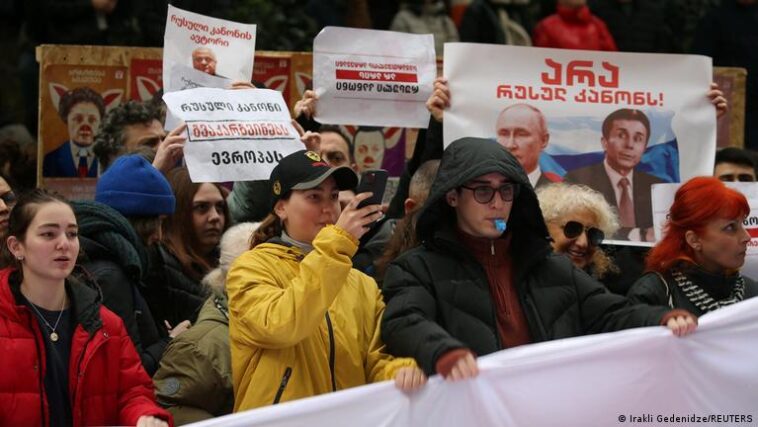Tbilisi: At least 30,000 protesters took to the streets of Georgia for a third consecutive day on Thursday, despite the governing party’s pledge to drop a controversial “foreign agent” bill reminiscent of legislation used by Russia to muzzle critics.
Protesters congregated outside the parliament building in the capital of Tbilisi, waving Georgian, Ukrainian, and EU flags, putting pressure on a government accused of flirting with the Kremlin and placing the Black Sea nation on an authoritarian path.
At the rally, the Georgian and Ukrainian national anthems as well as “Ode to Joy,” the anthem of the European Union, were performed. Protesters also chanted anti-government slogans, with some calling for the resignation of the government.
39-year-old mathematician Eka Kamkamidze told AFP, “Our government is the only impediment to joining the EU, which is willing to grant us membership candidature.”
Mamuka Kiria, a 30-year-old painter and protester, stated: “Georgians are united in their desire to join Europe, and the government is isolated — both from its people and the international community.”
He stated that the demonstrators desired “early elections” to remove the governing Georgian Dream party from power.
– “First triumph” –
This week, tens of thousands took to the streets in response to lawmakers’ initial support for the “foreign agents” measure. The Georgian police launched water cannons and tear gas at protesters on Tuesday and Wednesday.
Under duress, the Georgian Dream ruling party reversed course Thursday morning, announcing that it would withdraw the measure. However, the opposition vowed to continue its protests.
President Salome Zurabishvili sent a message of support to the demonstrators in a televised address from New York on Thursday evening.
“I would like to congratulate society on its initial triumph. I am pleased of the individuals whose voices were heard “Zurabishvili said.
As we pursue our European course, distrust of the government exists.
In a joint statement, opposition parties stated that protests would continue due to a lack of assurances “that Georgia is resolutely on a pro-Western course.”
In addition, they demanded the urgent release of dozens of detained demonstrators. Thursday evening, the interior ministry announced that all detainees had been released.
– ‘European future’ –
Tbilisi’s ties with Brussels have been severely harmed by the escalating international criticism of the country’s alleged democratic regression.
Brussels and Washington condemned Georgia’s proposed “foreign agent” law as a severe injury to its democracy.
The EU delegation in Georgia welcomed the government’s announcement that it was withdrawing the proposed law, adding that they “encourage all political leaders in Georgia to resume pro-EU reforms”.
The embassy of the United States in Tbilisi also applauded the news.
Embassy statement: “The Georgian people have once again made it plain that the only option for Georgia is a secure and prosperous European future.”
“We urge the governing party to officially withdraw these measures, which are incompatible with Georgian and European values and the protection of fundamental freedoms.”
Thursday, the Kremlin expressed concern over the massive demonstrations in neighbouring Georgia.
Moscow and Tbilisi fought a war in 2008, and Russia continues to control Georgia’s breakaway Abkhazia and South Ossetia regions, despite international recognition of the territories as belonging to Georgia.
– ‘Big moment’ –
According to Tom de Waal, a senior fellow at Carnegie Europe, both the measure and the police crackdown on demonstrators posed a significant challenge in the politically unstable country.
“It’s a momentous occasion for Georgia, a democracy that is still struggling,” he tweeted.
In Russia, the Kremlin has applied the label “foreign agent” to opponents, journalists, and human rights activists accused of leading political activities funded by foreign sources.
Since Russia’s invasion of Ukraine, Georgia has welcomed an influx of Russian anti-war activists. In recent weeks, however, authorities have barred the entry of some Kremlin critics, and some observers have warned of a drift towards Moscow.
The treatment of Georgia’s imprisoned ex-president Mikheil Saakashvili, whose health has deteriorated drastically in prison, has also drawn international condemnation.
Also read: Indian-Origin Man Convicted Of Trying To Avoid Cannabis Laws In The U.K.
The ruling party has maintained it remains committed to Georgia’s EU and NATO membership ambitions, which are enshrined in the constitution and endorsed by at least 80 percent of the population, according to opinion polls.
Irakli Garibashvili, the prime minister of Georgia, has defended his “balanced” policy as intended to promote “peace and stability.”
Georgia petitioned for EU membership alongside Ukraine and Moldova in February 2022, days after Russia invaded Ukraine.
EU leaders granted formal candidate status to Kyiv and Chisinau in June 2016, but stated that Tbilisi must first implement reforms.




